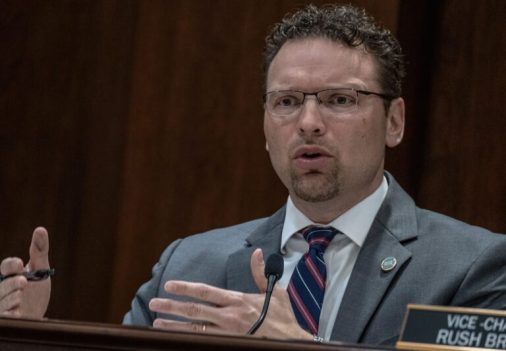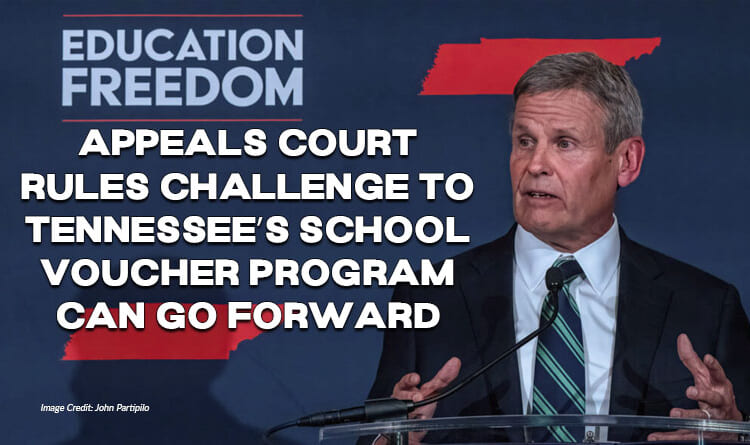Case sent back to trial court for judicial review.
Image: Gov. Bill Lee, pictured unveiling his plan for statewide private school vouchers on Nov. 28, 2023. Image Credit: John Partipilo
By Sam Stockard [Tennessee Lookout -CC BY-NC-ND 4.0] –
The Tennessee Court of Appeals has ruled a challenge to the state’s pilot Education Savings Account program in Davidson County can go forward.
In a Wednesday ruling, the Appeals Court reversed a three-judge panel and sent the case back to the trial court for judicial review based on its decision.
The Court of Appeals found that the trial court erred by deciding factual disputes over the effect of the voucher program on plaintiffs at the dismissal stage of the legal battle. Appellate judges also found the plaintiffs “alleged enough in their amended complaint to establish standing as both parents and taxpayers.” The ruling says their claims are “ripe for judicial review.”
After a separate legal battle, the state started the voucher program in August 2022 when the Tennessee Supreme Court ruled in favor of Gov. Bill Lee’s education initiative.
In this related case, a three-judge panel initially found that a group of Davidson County and Shelby County families lacked standing to challenge the program when they filed suit claiming it would divert taxpayer funds from public schools, “resulting in unique harm to these localities.”
The program at first allowed qualifying students in Metro Nashville and Shelby County school districts to receive about $8,000 in state funds to enroll in private schools. The Legislature added Hamilton County Schools district to the program in 2023, and as of November 2023, about 2,300 students were attending private schools using state vouchers.
Gov. Lee has since proposed a statewide voucher program to provide students about $7,000 each to attend private schools. In the first year, students could qualify based on family income, but in the second year, all students eligible for K-12 schools would qualify.
The trial court panel initially dismissed the plaintiffs’ argument that Metro Nashville and Shelby County would suffer financially if students moved to private schools and state funds followed them to pay for tuition and other costs. Judges noted part of the pilot program’s law replaces funds lost to vouchers in the first three years.
Attorneys for Metro Nashville arguing against the program in 2019 said the school district could lose tens of millions of dollars if students left for private schools and funds went with them.
This week’s ruling notes that plaintiffs presented information showing the General Assembly didn’t appropriate any funds for the voucher program in 2019 when it was enacted yet the Department of Education entered a $2.5 million contract in November 2019 with ClassWallet, a private Florida-based company that was to oversee online applications and payment systems. The state paid ClassWallet $1.2 million that first year.
In a main case that allowed the program to proceed, Metro Nashville claimed the program was unconstitutional because it applied only to Metro Nashville and Shelby County school districts, violating the state’s Home Rule Amendment, which prohibits laws from targeting specific counties without local approval. The trial court and Court of Appeals at first overturned the program, finding it unconstitutional, but the Supreme Court allowed it to move forward.
Hamilton, Madison and Knox counties were removed from the program in 2019 to ensure its passage. House Speaker Glen Casada held the vote board open for nearly 45 minutes to break a tie, working the chamber to find one more vote that April day.
Eventually, Rep. Jason Zachary, R-Knoxville, agreed to change his vote in favor of the bill after Casada offered to remove Knox County Schools as a voucher district.

According to the ruling, when students leave Metro Nashville and Shelby County districts for a private school, those districts lose the local and state shares of money, nearly $8,200 per student.
The voucher funding mechanism would work the same under a new K-12 funding formula, according to the ruling.
The plaintiffs argued that the loss of those funds hurts both districts’ ability to pay for fixed costs related to operating school buildings and systems.

About the Author: Sam Stockard is a veteran Tennessee reporter and editor, having written for the Daily News Journal in Murfreesboro, where he served as lead editor when the paper won an award for being the state’s best Sunday newspaper two years in a row. He has led the Capitol Hill bureau for The Daily Memphian. His awards include Best Single Editorial from the Tennessee Press Association. Follow Stockard on Twitter @StockardSam


